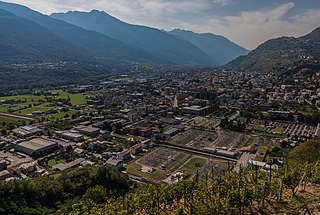
Sondrio is an Italian city,comune and administrative centre for the province of Sondrio,located in the heart of the Valtellina. As of 2015,Sondrio counted approximately 21,876 inhabitants. In 2007,Sondrio was named the Alpine Town of the Year.

Valtellina or the Valtelline;Lombard:Valtelina or Valtulina;German:Veltlin;Italian:Valtellina) is a valley in the Lombardy region of northern Italy,bordering Switzerland. Today it is known for its ski centre,hot spring spas,bresaola,cheeses and wines. In past centuries it was a key Alpine pass between northern Italy and Germany. The control of the Valtellina was much sought after,particularly during the Thirty Years' War as it was an important part of the Spanish Road.

Gerolamo "Nino" Bixio was an Italian general,patriot and politician,one of the most prominent figures in the Italian unification.

The Third Italian War of Independence was a war between the Kingdom of Italy and the Austrian Empire fought between June and August 1866. The conflict paralleled the Austro-Prussian War and resulted in Austria conceding the region of Venetia to France,which was later annexed by Italy after a plebiscite. Italy's acquisition of this wealthy and populous territory represented a major step in the Unification of Italy.
The Invasion of Trentino was a series of military operations undertaken by the Kingdom of Italy against the Austrian Empire during the Third Italian War of Independence of 1866,which was part of the larger Austro-Prussian War.

Enrico Sertoli was an Italian physiologist,histologist,anatomist,biologic chemist,physician,teacher,and inventor. He is remembered for his discovery regarding the branched cells of seminiferous tubules.

Brigandage in Southern Italy had existed in some form since ancient times. However,its origins as outlaws targeting random travellers would evolve vastly later on to become a form of a political resistance movement,especially from the 19th century onward. During the time of the Napoleonic conquest of the Kingdom of Naples,the first signs of political resistance brigandage came to public light,as the Bourbon loyalists of the country refused to accept the new Bonapartist rulers and actively fought against them until the Bourbon monarchy had been reinstated. Some claim that the word brigandage is a euphemism for what was in fact a civil war.

Giuseppe Gaetano Maria Govone was an Italian general and politician of Piedmontese origin,who played a major role in the Italian Risorgimento.

Li chiamarono... briganti! is a 1999 Italian film,directed by Pasquale Squitieri. It tells the story of Carmine Crocco,a 19th-century Italian brigand who gained recognition when he came to the forefront of the brigandage during the Italian unification,by opposing the army of King Victor Emmanuel II. It stars Enrico Lo Verso,Claudia Cardinale,Franco Nero,Remo Girone,Giorgio Albertazzi,among others. The movie was quickly suspended from its cinema run and it is not available on VHS or DVD. Some people think this was for the censorship of the Italian army.

Giovanni Romero (1841-1896) was an Italian colonel who participated in several conflicts during the 19th century. He participated in the Second Italian War of Independence and the Third Italian War of Independence,most notably leading the 4th Africa Infantry Regiment during the Battle of Adwa of the First Italo-Ethiopian War before being killed at the battle. Romero was also a posthumous recipient of the Gold Medal of Military Valour.

Giuseppe Caruso,nicknamed "Zi 'Beppe",was an Italian brigand,the most renowned of the Lucan bands. He was,with Giovanni 'Coppa' Fortunato and Ninco Nanco,one of the most ruthless deputies of Carmine Crocco,but also,after being handed over to the Savoy authorities in 1863,one of the men responsible for the suppression of banditry in the Vulture. According to Crocco,Caruso killed 124 people in about four years as a fugitive.

The Operations in Valtellina was a battle of the Third Italian War of Independence and consisted in the penetration of Austrian units of the 8th Division of General Franz Kuhn von Kuhnenfeld operating in Trentino against the Italian Volunteer Corps of Giuseppe Garibaldi and in the subsequent Italian counterattack of the Mobile National Guard commanded by Colonel Enrico Guicciardi.

Alessandro Asinari di San Marzano (1830–1906) was an Italian politician,general,and Senator of the Kingdom of Italy
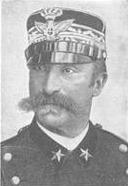
Giuseppe Ottolenghi (1838–1904) was an Italian general and politician.
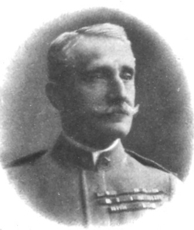
Vittorio Camerana was an Italian general who commanded the III Army Corps of World War I. At the end of the war,he was promoted to General of the Army Corps and decorated with the Grand Officer Cross of the Military Order of Savoy.

Antonino Di Giorgio was an Italian general and politician,who fought in the First Italo-Ethiopian War,the Italo-Turkish War and the First World War,and served as Minister of War of the Kingdom of Italy from April 1924 to April 1925. He resigned after the rejection of his plan for a radical reform of the Royal Italian Army.
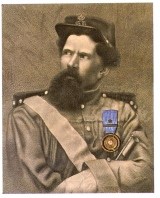
Pietro Pedranzini was an Italian Lieutenant of the First Italian War of Independence and the Third Italian War of Independence. He was one of the main commanders behind the Operations in Valtellina and received a Gold Medal of Military Valour for his service.

Bernardino Milon was an Italian general and politician. He was a deputy from May 1880 and Minister of War in the third Cairoli government (1880).
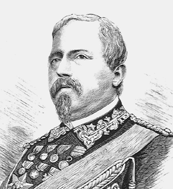
Cesare Amedeo Augusto Bonelli was an Italian politician and general,veteran of the Italian Wars of Independence. He was Senator of the Kingdom of Italy in the XIII legislature,and held the position of Minister of War in the first,second and third Cairoli government.

The 52nd Infantry Regiment "Alpi" is an inactive unit of the Italian Army last based in Portogruaro. The regiment carries the traditions of Giuseppe Garibaldi's Hunters of the Alps,which were formed in spring 1859 for the Second Italian War of Independence. In September 1859,the five Cacciatori delle Alpi regiments were merged into two regiments and integrated into the Royal Sardinian Army's infantry arm. In 1866,the 52nd Infantry Regiment "Alpi" participated in the Third Italian War of Independence. In 1911-12 the regiment fought in the Italo-Turkish War. During World War I,the regiment fought on the Italian front and then on the Western Front. Before the outbreak of World War II,the regiment was assigned to the 22nd Infantry Division "Cacciatori delle Alpi",with which it fought in the Greco-Italian War and was then sent to occupied Yugoslavia as occupation force. After the announcement of the Armistice of Cassibile on 8 September 1943 the division and its regiments were disbanded by invading German forces.



















